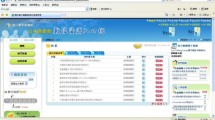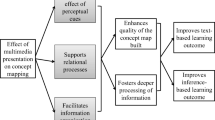Abstract
This article explores the use of a multimedia search interface for digital libraries based on strand maps developed by the American Association for the Advancement of Science. As semantic-spatial displays, strand maps provide a visual organization of relevant conceptual information that may promote the use of science content during digital library use. A study was conducted to compare users' cognitive processes during information seeking tasks when using a multimedia strand maps interface, versus the textual search interface currently implemented in the Digital Library for Earth System Education. Quantitative and qualitative data from think-aloud protocols revealed that students were more likely to engage with science content (e.g., analyzing the relevance of science concepts with regard to task needs) during search when using the strand maps interface compared to those using textual searching. In contrast, students using a textual search interface engaged more frequently with surface-level information (e.g., the type of a resource regardless of its science content) during search and retrieval. As a multimedia search interface for digital libraries, strand maps appear to be promising tools to promote conceptual discovery and learning through content-based processes that promote learner engagement with relevant science knowledge.
Similar content being viewed by others
References
Macdonald, J., Mason, R.: Information handling skills and resource based learning in an open university course. Open Learn. 13, 38–42 (1998)
Deniman, D., Sumner, T., Davis, L., Bhushan, S., Fox, J.: Merging metadata and content-based retrieval methods. J. Digit. Inf. 4 (2003) http://jodi.ecs.soton.ac.uk/Articles/v04/i03/Deniman.
NRC: National Science Education Standards. Washington, DC: National Research Council (NRC), National Academy Press (1996)
Sumner, T., Marlino, M.: Digital Libraries and Educational Practice: A Case for New Models. ACM/IEEE Joint Conference on Digital Libraries (JCDL '04) Tuscon, AZ, ACM Press (2004)
AAAS: Benchmarks for Science Literacy. New York: Project 2061, American Association for the Advancement of Science, Oxford University Press (1993)
AAAS: Atlas of Science Literacy. Washington, DC: Project 2061, American Association for the Advancement of Science, and the National Science Teachers Association (2001a)
AAAS: Science for All Americans. New York: Project 2061, American Association for the Advancement of Science, Oxford University Press (1989)
AAAS Designs for Science Literacy. New York: Project 2061, American Association for the Advancement of Science, Oxford University Press (2001b).
Marlino, M., Sumner, T.R., Fulker, D., Manduca, C., Mogk, D.: The Digital Library for Earth System Education: Building Community, Building the Library. Communications of the ACM Special Issue on Digital Libraries, pp. 80–81 (2001)
NSDL: National Science Digital Library Progress Report: Fall 2000–Summer 2003. Boulder, CO, NSDL: 29 (2003)
Kuhlthau, C.C.: Longitudinal case studies of the information search process of users in libraries. Libr. Inf. Sci. Res. 10, 257–304 (1988)
Kuhlthau, C. C., Tama, S.L.: Information search process of lawyers: A call for ‘just for me’ information services. J. Doc. 57, 25–43 (2001)
Vakkari, P.: A theory of the task-based information retrieval process: A summary and generalisation of a longitudinal study. J. Doc. 57, 44–60 (2001)
Furnas, G.W., Landauer, T.K., Gomez, L.M., Dumais, S.T.: The Vocabulary Problem in Human-System Communication. Commun. ACM 30, 964–971 (1987)
Mayer, R.E.: Multimedia Learning. Cambridge, Cambridge University Press (2001)
Carney, R.N., Levin, J.R.: Pictorial illustrations still improve students' learning from text. Educ. Psychol. Rev. 14, 5–26 (2002)
Goldman, S.R.: Learning in complex domains: when and why do multiple representations help? Learn. Instr. 13, 239–244 (2003)
Mayer, R.E.: The promise of multimedia learning: using the same instructional design methods across different media. Lear. Instr. 13, 125–139 (2003)
Narayanan, N.H., Hegarty, M.: Multimedia design for communication of dynamic information. Int. J. Hum.-Comp. Stud. 57, 279–315 (2002)
Marchionini, G.: Information Seeking in Electronic Environments. Cambridge: Cambridge University Press (1995)
Chmielewski, T.L., Dansereau, D.F.: Enhancing the recall of text: knowledge mapping training promotes implicit transfer. J. Educ. Psychol. 90, 407–413 (1998)
O'Donnell, A.M., Dansereau, D.F., Hall, R.H.: Knowledge maps as scaffolds for cognitive processing. Educ. Psychol. Rev. 14, 71–86 (2002)
Rewey, K.L., Dansereau, D.F., Skaggs, L.P., Hall, R.H., Pitre, U.: Effects of scripted cooperation and knowledge maps on the processing of technical material. J. Educ. Psychol. 81, 604–609 (1989)
North, C., Schneiderman, B.: Snap-together visualization: Can users construct and operate coordinated visualizations? Int. J. Human Comp. Stud. 53, 715–739 (2000)
Binding, C., Tudhope, D.: KOS at your service: Programmatic access to knowledge organisation systems. J. Digit. Inf. 4 (2004) http://jodi.ecs.soton.ac.uk/Articles/v04/i04/Binding/.
Arms, W., Hillmann, D. et al.: A Spectrum of Interoperability: The Site for Science Prototype for the NSDL. D-Lib Magazine. 8 (2002) http://www.dlib.org/dlib/january02/arms/01arms.html.
OAI: The Open Archives Initiative Protocol for Metadata Harvesting. OAI-PMH, Open Archives Initiative. Last accessed 2005 (2001)
Ahmad, F., Bhushan, S., Gu, Q., Sumner, T.: The concept space interchange protocol. ACM/IEEE Joint Conference on Digital Libraries (JCDL ′04) Tuscon, AZ, ACM Press (2004)
Sumner, T., Ahmad, F., Bhushan, S., Gu, Q., Molina, F., Willard, S., Wright, M., Davis, L., Janee, G.: Linking learning goals and educational resources through interactive concept map visualizations. Int. J. Digit. Libr. 5, 18–24 (2005)
Sumner, T., Ahmad, F., Gu, Q., Molina, F., Willard, S., Wright, M., Davis, L., Bhushan, S., Janee, G.: A web service interface for creating concept browsing interfaces. D-Lib Magazine 10 (2004)
W3C: Scalable Vector Graphics (SVG) 1.1 Specification, Ferraiolo, Jon, Fujisawa, Jun, and Jackson, Dean. Last accessed 2004 (2003)
Gu, Q., Ahmad, F., Molina, F., Sumner, T.: Dynamically generating conceptual browsing interfaces for digital libraries using SVG. Third Annual Conference on Scalable Vector Graphics (SVG Open ′04) Tokyo, Japan (2004)
Ericsson, K.A., Simon, H.A.: Protocol Analysis: Verbal Reports as Data (Rev. ed.), Cambridge, MA, MIT Press (1993)
Chi, M.T.H., de Leeuw, N., Chiu, M.-H., LaVancher, C.: Eliciting self-explanations improves understanding. Cogn. Sci. 18, 439–477 (1994)
Kintsch, W.: Comprehension: A Paradigm for Cognition. Cambridge: Cambridge, University Press (1998)
Author information
Authors and Affiliations
Corresponding author
Rights and permissions
About this article
Cite this article
Butcher, K.R., Bhushan, S. & Sumner, T. Multimedia displays for conceptual discovery: information seeking with strand maps. Multimedia Systems 11, 236–248 (2006). https://doi.org/10.1007/s00530-005-0004-y
Published:
Issue Date:
DOI: https://doi.org/10.1007/s00530-005-0004-y




